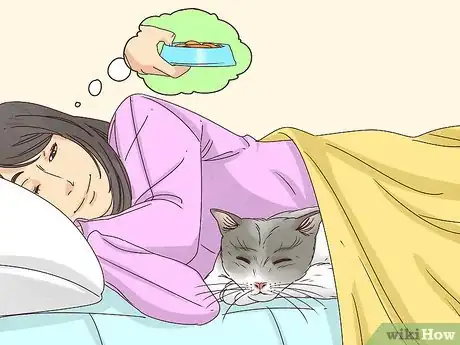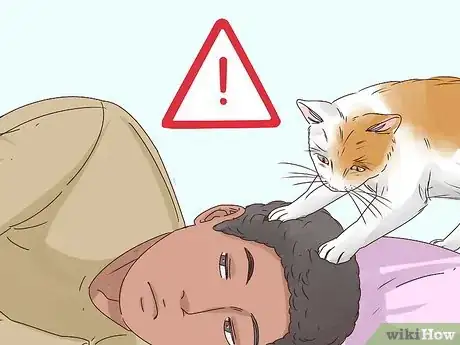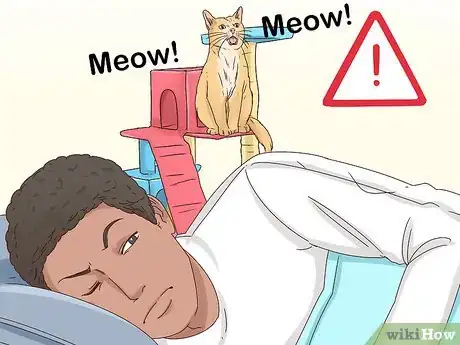This article was co-authored by Brian Bourquin, DVM and by wikiHow staff writer, Christopher M. Osborne, PhD. Brian Bourquin, better known as “Dr. B” to his clients, is a Veterinarian and the Owner of Boston Veterinary Clinic, a pet health care and veterinary clinic with three locations, South End/Bay Village, the Seaport, and Brookline, Massachusetts. Boston Veterinary Clinic specializes in primary veterinary care, including wellness and preventative care, sick and emergency care, soft-tissue surgery, dentistry. The clinic also provides specialty services in behavior, nutrition, and alternative pain management therapies using acupuncture, and therapeutic laser treatments. Boston Veterinary Clinic is an AAHA (American Animal Hospital Association) accredited hospital and Boston’s first Fear Free Certified Clinic. Brian has over 19 years of veterinary experience and earned his Doctor of Veterinary Medicine from Cornell University.
There are 11 references cited in this article, which can be found at the bottom of the page.
wikiHow marks an article as reader-approved once it receives enough positive feedback. In this case, 94% of readers who voted found the article helpful, earning it our reader-approved status.
This article has been viewed 609,760 times.
Sure, you love the idea of your cat cuddling up with you in your bed at night, but can you get your feline pal to agree? Some cats are easier to convince than others, so this article lists several tips that may help you persuade your cat to sleep in your bed. Go ahead and try out a few—with a little luck and your cat’s approval, you can have peaceful, sleepy nights together for years to come!
Steps
Expert Q&A
Did you know you can get expert answers for this article?
Unlock expert answers by supporting wikiHow
-
QuestionI always leave the door open for my cat, just in case he needs to go to the bathroom. Is that necessary?
 Pippa Elliott, MRCVSDr. Elliott, BVMS, MRCVS is a veterinarian with over 30 years of experience in veterinary surgery and companion animal practice. She graduated from the University of Glasgow in 1987 with a degree in veterinary medicine and surgery. She has worked at the same animal clinic in her hometown for over 20 years.
Pippa Elliott, MRCVSDr. Elliott, BVMS, MRCVS is a veterinarian with over 30 years of experience in veterinary surgery and companion animal practice. She graduated from the University of Glasgow in 1987 with a degree in veterinary medicine and surgery. She has worked at the same animal clinic in her hometown for over 20 years.
Veterinarian
-
QuestionWhy do kittens fight in the night?
 Pippa Elliott, MRCVSDr. Elliott, BVMS, MRCVS is a veterinarian with over 30 years of experience in veterinary surgery and companion animal practice. She graduated from the University of Glasgow in 1987 with a degree in veterinary medicine and surgery. She has worked at the same animal clinic in her hometown for over 20 years.
Pippa Elliott, MRCVSDr. Elliott, BVMS, MRCVS is a veterinarian with over 30 years of experience in veterinary surgery and companion animal practice. She graduated from the University of Glasgow in 1987 with a degree in veterinary medicine and surgery. She has worked at the same animal clinic in her hometown for over 20 years.
Veterinarian Most cats are night-time hunters. They are most active at night and therefore are either playing together or getting into fights. Kittens especially have yet to reset their time clock (as adult cats can learn to be active during the day and sleep at night), so they are at the greatest risk of fighting during the hours of darkness.
Most cats are night-time hunters. They are most active at night and therefore are either playing together or getting into fights. Kittens especially have yet to reset their time clock (as adult cats can learn to be active during the day and sleep at night), so they are at the greatest risk of fighting during the hours of darkness. -
QuestionMy kitten meows super loud when I'm gone. How can I stop this?
 Pippa Elliott, MRCVSDr. Elliott, BVMS, MRCVS is a veterinarian with over 30 years of experience in veterinary surgery and companion animal practice. She graduated from the University of Glasgow in 1987 with a degree in veterinary medicine and surgery. She has worked at the same animal clinic in her hometown for over 20 years.
Pippa Elliott, MRCVSDr. Elliott, BVMS, MRCVS is a veterinarian with over 30 years of experience in veterinary surgery and companion animal practice. She graduated from the University of Glasgow in 1987 with a degree in veterinary medicine and surgery. She has worked at the same animal clinic in her hometown for over 20 years.
Veterinarian This could be a sign she is anxious in your absence. Be sure to play with her regularly, so she is tired just before you go out. Schedule a meal for just before your departure, so she has a full tummy and is sleepy. Also, provide her with a comfortable place to sleep that is covered with a T-shirt that smells of you, and perhaps put a heat mat underneath to make it especially attractive.
This could be a sign she is anxious in your absence. Be sure to play with her regularly, so she is tired just before you go out. Schedule a meal for just before your departure, so she has a full tummy and is sleepy. Also, provide her with a comfortable place to sleep that is covered with a T-shirt that smells of you, and perhaps put a heat mat underneath to make it especially attractive.
References
- ↑ https://www.pdsa.org.uk/taking-care-of-your-pet/looking-after-your-pet/kittens-cats/exercise-for-your-cat
- ↑ Brian Bourquin, DVM. Veterinarian. Expert Interview. 31 January 2020.
- ↑ https://www.sfspca.org/resource/nocturnal-behavior/
- ↑ https://www.sfspca.org/resource/nocturnal-behavior/
- ↑ Brian Bourquin, DVM. Veterinarian. Expert Interview. 31 January 2020.
- ↑ http://www.cathealth.com/training-your-cat/training-your-cat-to-let-you-sleep
- ↑ http://www.vetstreet.com/dr-marty-becker/why-doesnt-my-cat-sleep-in-bed-with-me
- ↑ http://www.humanesociety.org/animals/cats/tips/training_your_cat_positive_reinforcement.html
- ↑ Brian Bourquin, DVM. Veterinarian. Expert Interview. 31 January 2020.
- ↑ http://www.catster.com/lifestyle/cat-behavior-behaviorist-interview-cats-sleeping-cardboard-boxes
- ↑ https://www.sfspca.org/resource/nocturnal-behavior/
- ↑ http://www.catster.com/lifestyle/5-tips-to-get-your-cat-to-let-you-sleep
- ↑ Brian Bourquin, DVM. Veterinarian. Expert Interview. 31 January 2020.
- ↑ http://www.cat-world.com.au/General-Cat-Articles/kitten-meowing-all-the-time.html
- ↑ http://www.aspca.org/pet-care/cat-care/common-cat-behavior-issues/older-cats-behavior-problems
- ↑ https://www.catster.com/lifestyle/cat-health-sleep-disorders-ask-a-vet
About This Article
If you want your cat to sleep with you, try to tire it out right before bed by playing with for about 10 minutes. Alternatively, feed your cat right before you head to bed since cats normally go to sleep after eating. Then, place an item of clothing on the bed that has your scent on it, like a recently worn sweatshirt, to give your cat a comforting spot to rest. If your cat seems reluctant to stay on the bed, consider setting up a perch nearby to give your cat the option of joining you when it wants to. For more advice from our Veterinary reviewer, including how to get your cat to sleep through the night, keep reading.










































































